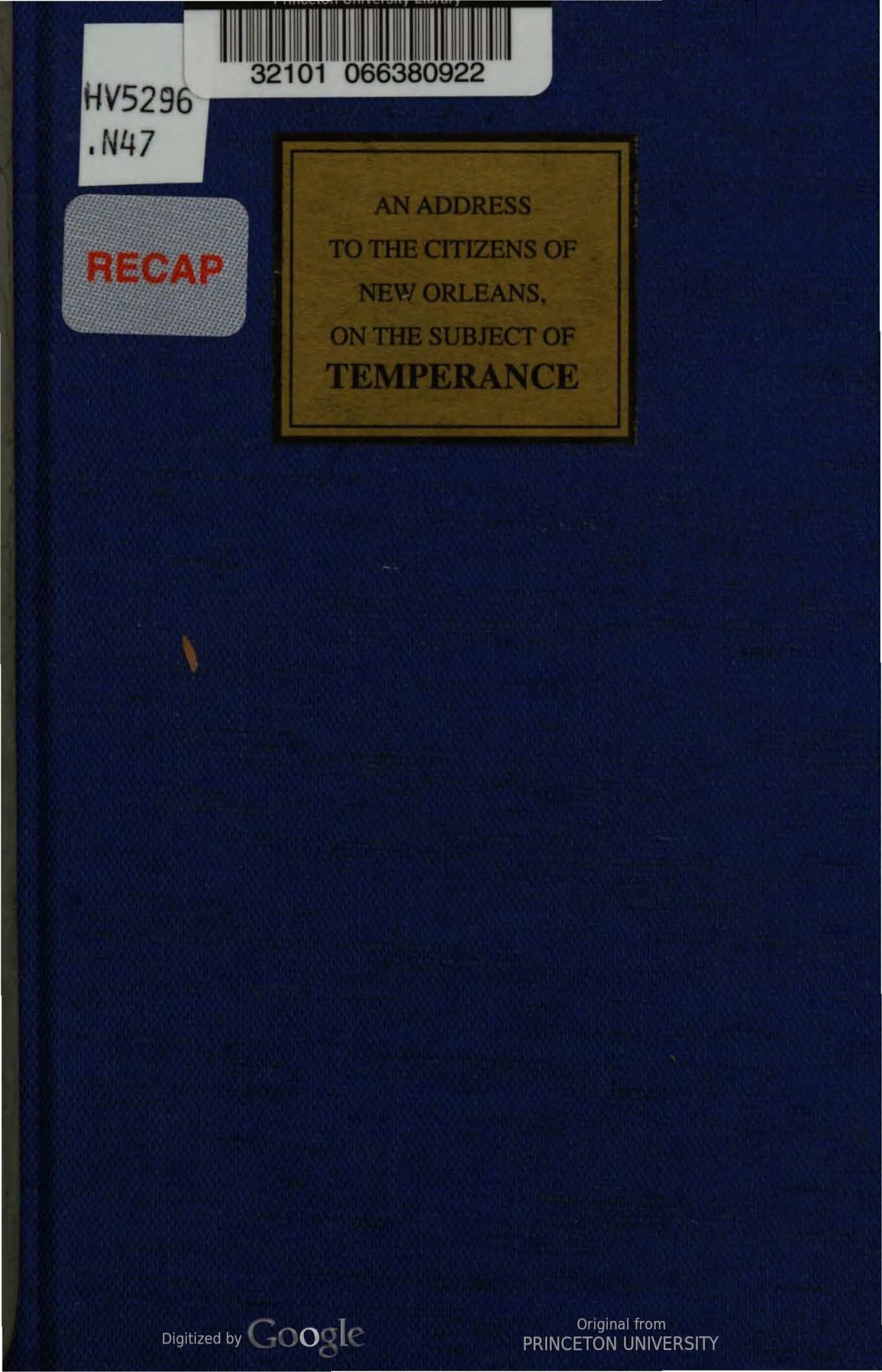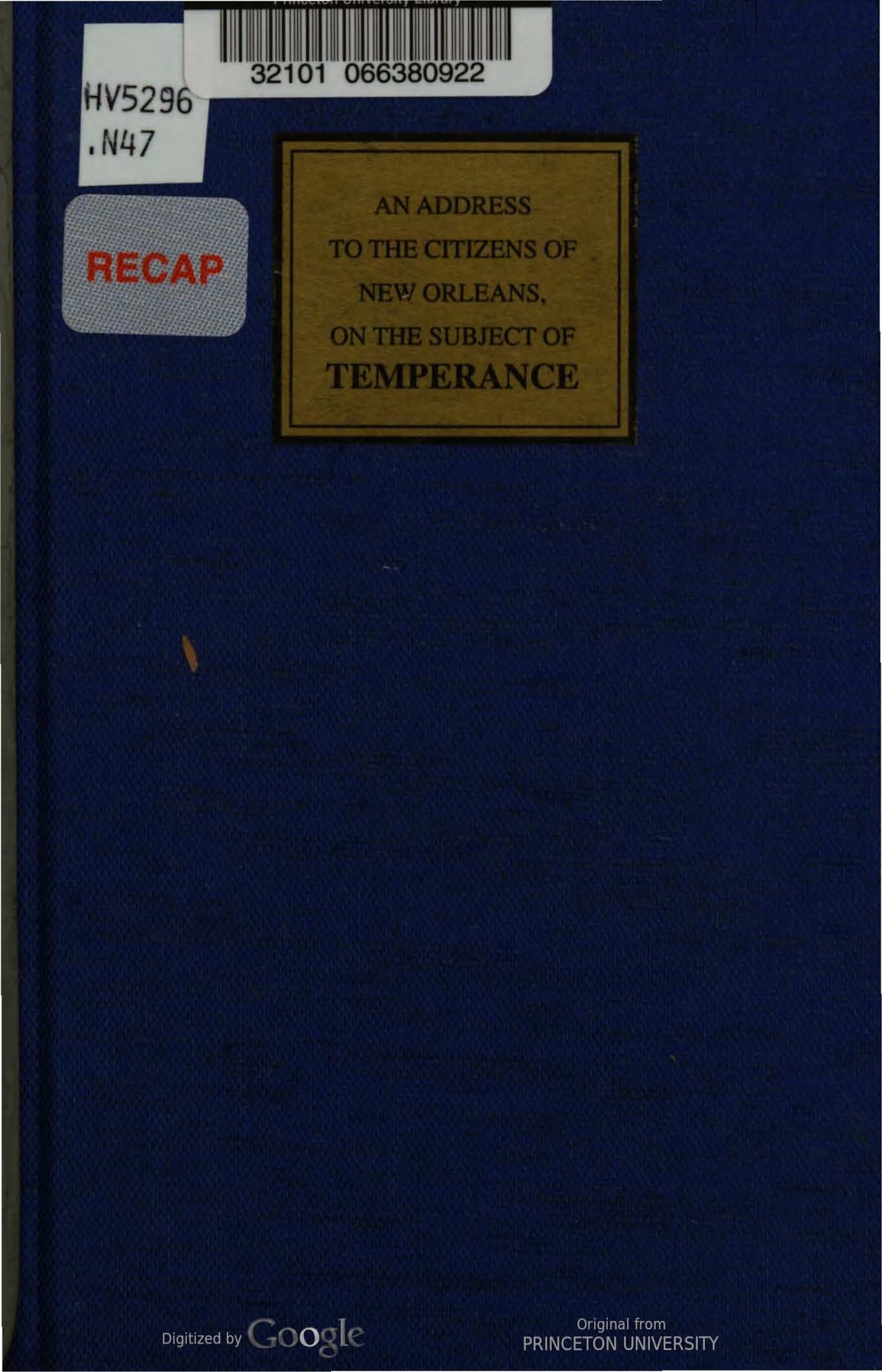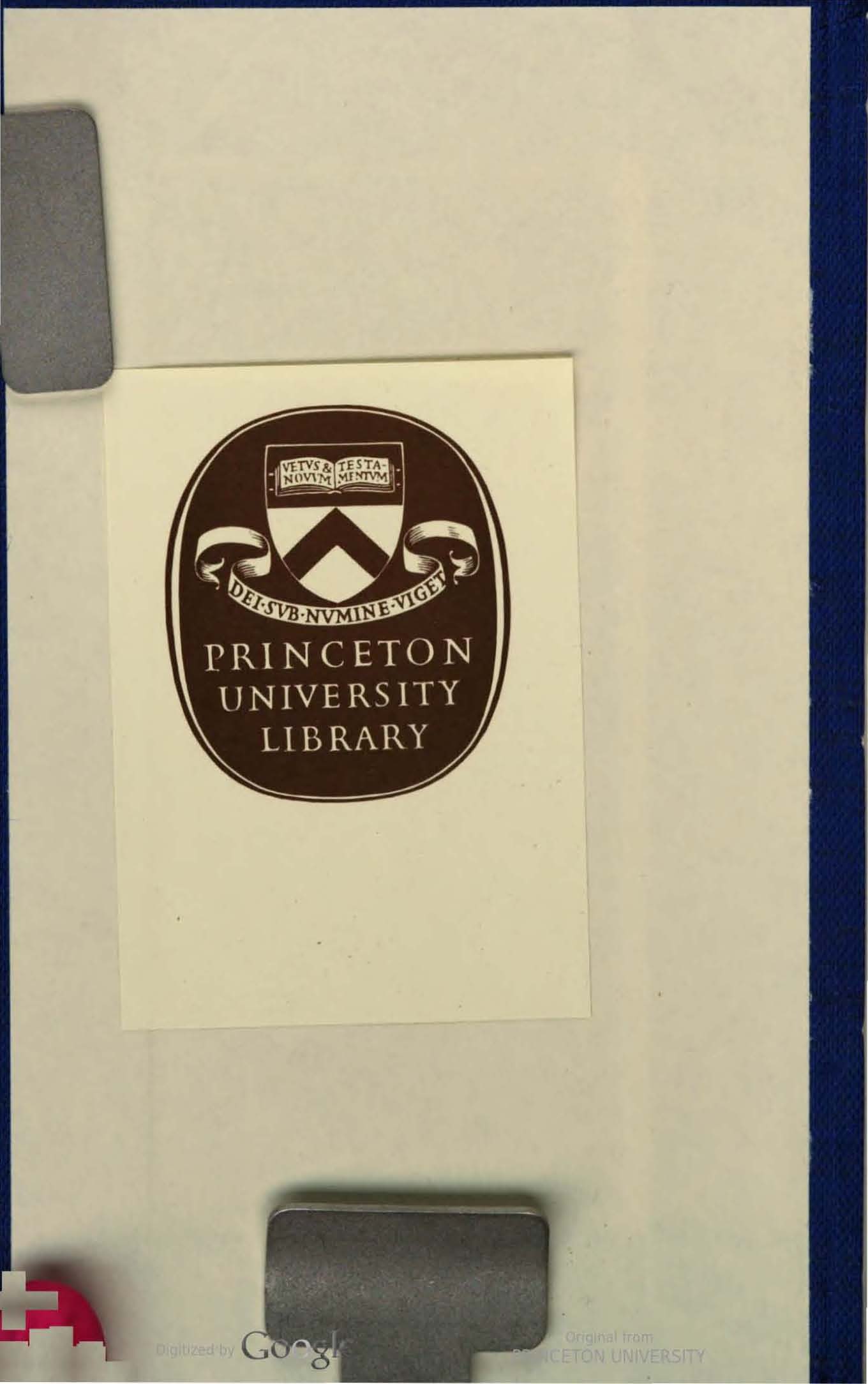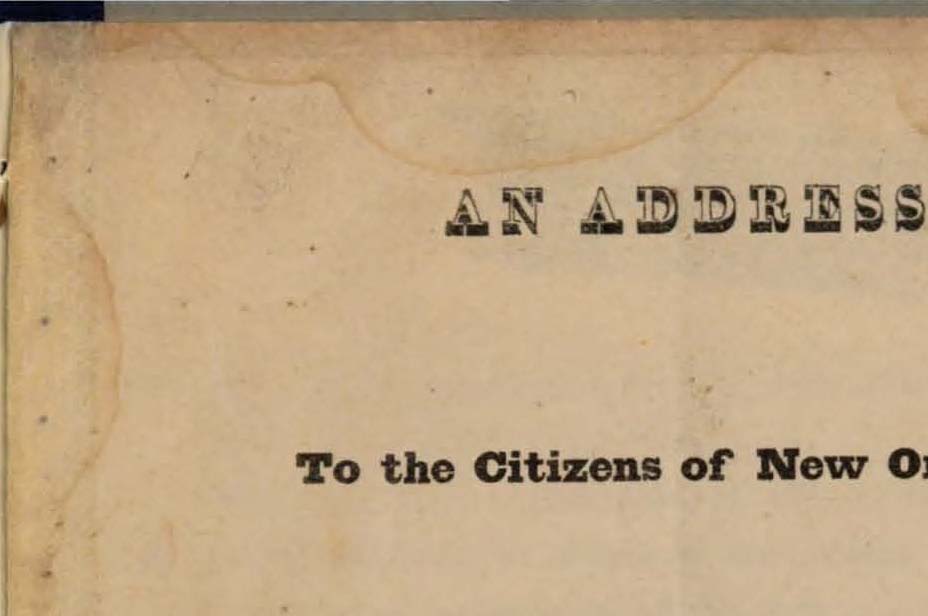TEMPERAN CE.
PUBLISHED BY ORDER OF THE
NEW ORLEANS TEMPERANCE SOCIETY.
,
NEW ORLEANS.
TOY, PRINTER, OFFICE OF THE LAFAYETTE CITY ADVERT13ER.
1841.
Go gle
•
•
•
,.
•
\.
Go gle
,
Extract from the proceedings of tlte New Orleans Temperance Society, oj the 20th July, 1841. "Resolved, That a committee of five be appointed for the
purpose of preparing an address to the citizens of New Orleans, on the subject of temperance, setting forth in a concise statistical view, all the facts connected with this great cause, and to recommend to our fellow-citizens a harmony of purpose and unity of action in defence of its principles.
Whereupon the president appointed the Hon. JOSHUA BALDWIN, Chairman, Dr. E. H. BARTON, Dr. J. M. W. PICTON,
J. A. MAYBIN, Esq.,
TJIO~[AS GIBBS MORGAN, Esq., to compose said committee."
•
Extract from tlte proceedillgs of the monthiy meeting ojthe New Orleans Temperance Society, held on the 23£1 of August, 18"11.
On motion of Edwarrl Rawle, Esq.,
"Resolved, That the able address which has been presented to the society, by the committee appointed at the last meeting, be accepted, and that five thousand copies be printed. for grat.uitollS distribution.' ,
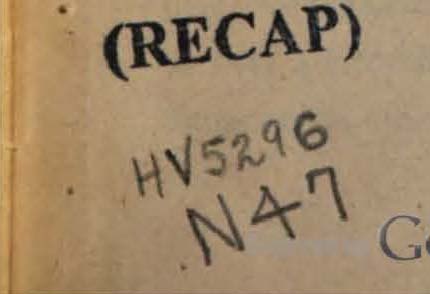
604165
Go g1e
I
•
Go gle
•
FELLOW CITIZENS:
THE cause of Temperance 1S not a new enterprize, started and upheld by a few, but has long since engaged the attention, and elicited the favorable regard of many of our most distinguished and honored citizens; and it is a circumstance which seems peculiar to our age, and is full of hope and consolation that like every other enterprise having in view the good of mankind, it has fastened itself so immediately and so powerfuliy on society, that its effects have already reached far beyond the utmost hopes of its most ardent friends.
For the cause of Temperance we bespeak a candid and careful consideration, confident of its result, not only because it advances the interest and greatly secures the happiness of individuals, but the interests and happiness of society generally.
From infancy every person is placed in a sort of moral school, in which he receives from, or imparts to, those around him, either good or bad instruction.
Situated as New Orleans is, having intimate intercourse with BJ many of the Btates ch the Union, it will readily be perceived
, that it is important that her standard of morals should be such, as to bear a favorable comparison with, or be recommendable for imitation to, others.
G
Can this standard be attained III the absence of any effort in
the cause of Temperance? It is believed not, and in furtherance
of that conviction it is thought the enterprise of Temperance has
lately received accessions; that many of the good people of New
Orleans have enlisted as soldiers in the arduo trife, now being
waged with indomitable energy and perseverance against this
poisonous and insidious foe of man, under the glorious banner of
Temperance.
In 1811, the first Temperance Society that ever existed in the United States, perhaps in the world, was formed in Massachusetts, called the" Massachusetts Temperance Society." A few benevolent citizens, perceiving the pernicious effect.'! of the use of ardent spirits on their immediate friends and neighbors, united themselves, together with a view of abating tile evil. A public meeting was called, a society organized, and the attention of the community directed to the subject. Facts were collected and published, and it was soon perceived that the evil of intemperance had pervaded the community to an alarming extent, and that the tremendous evil threatened, and was fast tending to overthrow the whole fabric of social existence.
The awful precipice over which they were leaning was fully
seen, when systematic and vigorous efforts were taken to restrain
and prevent the use of the deleterious liquid.
But after several years of investigation and of effort, it was discovered that the principle upon which the society was established was an erroneous one, not being founded on total abstinence from ardent spirits, and in its place was organized. in 1826, the "American Temperance Society," on that which is the only true principle upon which intemperance could be attacked, as the result has most amply illustrated.
This society commenced the work with appropriate vIgor:
Go gle
7
and investigations of the most searching and extended character
were made; jails, penitentiaries, asylums, 'hospitals and poor
houses, were explored. The opinions of physicians, prosecuting
attorneys, judges, and others competent to decide, were taken, and
from the result it was reasonably feared, the country ~vas fast bee
coming a nation of drunkards, and that , it was high time for the
patriots to sound the alarm, and take a corresponding stand on
this momentous subject.
From this beginning has sprung up that mighty moral machinery
of temperance societies, that is now found to exist in vigor in
every State of the Union, and as far exceeding in usefulness all
other discoveries of the age, as mind exceeds matter.
Not only has every State, and most of the cities and towns
throughout the ,Union, their temperance institutions, but a "Na
tional Temperance Society" has also been formed, and is now seen
raising her head and stretching out her broad wings all over this
extensive country, endeavoring to shelter and protect her many
sons and daughters from the destructive effect~ of ardent spirits.
Near five hundred delegates, representing almost every state, regularly attend its meetings, and throw much light upon all the subjects which agitate the community, seeking relief from the evils of drunkenness.
At the meeting held last month at the Saratoga Springs, about nve hundred and fifty delegates were in attendance. To the friends of the cause of Temperance no spectacle could be more ' cheering than to witness one of those conventions; men of all parties in politics, of all sects in relig;on, men coming from all parts of the Union, laying aside their politics, subduing their sectarian predelictions, and forgetting their local partialities, united on a common platform to sustain a cause which they held identical with humanity, benevolence and patriotism. There were assembled
Go gle
s
as one common family, governors, chancellors, judges, members of Congress, clergy of different religious . denominations, yeomen of the country, the honest laborer, the industrious and ingenious mechanic, all zealously endeavoring to emulate each other in the noble strife of devising ways and means for rescuing our country from the ruinous effects of intemperance.
It is truly gratifying to the friends' of Temperance, to see that
the cause interests all classes and conditions of men; members of
Congress and heads of departments in Washington City, have
shown their views and feelings on thIS subject. They beheld a
l1Umber of their countrymen of all classes, from the honest and
hardy laborer, to the accomplished and erudite scholar, and the
gifted and honored statesman, fall victims to the destructi ve power
of intemperance.
In view of this they united themselves together in the year 1833, and formed a "Congressional Temperance Society" by electing for their ·president a senator of the United States, and for other officers, distinguished persons connected with the general government, with aview of raising at the capital of their beloved country, such a standard in that cause, as best became it.
.An essential change was soon after perceived among the mem
bers of Congress, in the diminished use of ardent spirits.
Several messes made up of members have passed entire sessions
without having ardent spirits on their side-boards, or wine at their
tables; even more recently the cheering intelligence has been
sounded abroad, that the chief magistrate of the Union has
adopted the rule of excluding wine from his table.
This action by those high in authority, was, however, but the
auspicious beginning.
Until the session of Congress in 1838, the two spacious rooms
in the basement of the capitol, kept as places of refreshment, had
•
Go gle
•
-,
each a large bar, filled with all kinds of ardent spirits, where the
members of Congress freely partook of intoxicating drink.
Early in that session, the two Houses concurred in passing a
joint standing rule, forbidding the sale or.exhibition of spirituous
liquor within the capitol, or on the public g.round adj acent thereto.
While this removes temptation of the most dangerous character
from the representatives 'of the nation, it is an expression of
public opinion against this traffic, which cannot fail to have great
influence wherever known.
In. 1832, General Cass, the then secretary of war, amI now our minister to France, issued an order forbidding the further allowance of ardent spirits to the troops of the United States, as a component part of the ration, or the introduction of any ardent spirits into any fort, camp or garrison, except when the troops were on fatigue duty. ' This laudable and praiseworthy effert of General Cass, was not without its benefit-the army in general experiencing the most happy results from it. Indeed a petition was subsequently presented to both houses. of Congress, signed by officers of the army, praying that the r~maining portion of this noxious ration might be discontinued, and assigned as a reason, that it not only failed to answer the end for which it was designed, but its continuance resulted in insubordination, disease and crime.
About 1200 vessels sail from the ports of our country under the Temperance flag, without ardent spirits on board, except like laudanum, or other medicine, in their medicine chests; some of them .' on three years' cnlize, or dangerous and harassing whale voyages.
In almost cvery port there are temperance boarding houses for the sailors-that long neglected and injured class of our countrymen-to rescue them from shipwreck on shore as well a.s on the deep. Though our gallant navy, the .pride of every Americ an and our never failing arm in the hour of danger, has not yet he('n
Go gle
rescued from thc daily rations, yet from scveral circumstances there is great reason to hope that the time is not far distant when the practice will be entirely discontinued. And we .would refer with pleasure to the generous sacrifices which have been made Ly lUany of the proprietors of our large hotels, in the most populous cities of our Union, in converting them into temperance houses; and we have the gratifying intelligence to communicate, that those establishments have not only increased their custom, but elevated their respectability, and powerfully contributed to promote the cause.
The last 4th of July was celebrated in many parts of our country, by the friends of Temperance. The procession in Boston amounted to 7,000 men; that in Worcester, State of Massachusetts, was preceded by about 1,500 ladies. At the procession in Alban.y, State of New York, there were 1,200 Irishmen, with the device on their banners, pledged to total abstinence.
The Catholic Total Abstinence Society in Philadelphia, amounting to 2,000 men, marched through the streets, preceded by their principal clergymen, and bearing banners of the most splendid description.
But though the temperance cause is an American institution, and our country is, and through all time will be, honored for being its birth-place, it has, like all other American institutions and principles, not only blessed our own beloved land, but some of the most important parts of the old world; for these great and sacred institution are destined to affect the happiness and tinge the destiny of all mankind, till time is no more.
England has her" British and Foreign Temperance Society" with her hundreds of thousands of members patronised by the queen. But organised only on principles that do not strike at the root of the evil, it has )leVer been very efficaciolls in the sllppressiol,
Go gle
j
•
•
11
of drunkenness. That association has, however, been lately s~crseded by the formation of the "British and Foreign Total Abstinence Society," under the most favorable auspices, headed as it is, by Earl Stanhope, as president; and the temperance principles are taking deeper root in the public mind in that great kingdom.
In Scotland, particularly in Edinburg and Glasgow, the s~ats of learning, the cause has many advocates, and its progress is encouragmg .
. Ireland-ill-fated Ireland, so long peeled and ground to the dus t, has mosfnobly put on th(armor of Temperance, :1Ild risen in one
rresistable mass, to take-the temperance pledge. Where a short time ago, beggary, rapine, rob~ery, contempt of law, and murder prevailed, now, sobriety, order, domestic peace and comfort have taken their place. She has upwards of 5,000 societies, and 5,000,000 of her population pledged to the cause of total abstinence.
On the Continent, the cause of Temperance is onward. The King and Council of Prussia have ordered the formation of temperance societies in every province, and requested thc cl!Jrgy to present the subject in their pulpits, and the temperance history, prepared by the Rev. Robt. Baird, of the United States, to be used
~ as a text-book, in every school in the kingdom. In Sweden the temperance cause is advancing under the favourable patronage of the king, and of the crown prmce, as president of a Temperance Society. In France the subject has lately arrested public attention; official enquiries have been made into t.he operations and results of temperance societies ill America, with a view of profiting by her experience and example. The subject has been strongly laid before the emperor of Rus-
Go g.e
SHI and Austria ; the king of Holland and Denmark, and other
sovereigns in Europe, have received it with a favorable attention.
In New Zealand, once noted f,)l' cannibalism, the Temperance tree has taken root, and the chief, after upbraiding the civilized white man, for introducing ardent sl)irits to his people, and making him a drunkard, declared there was no way to stop the evil, but by banishing it from the island altogether: and without carrying the detail too far, suffice it to say, that the cause of Temperance has been commenced and is going on efficiently in Australia, New South Wales, Van Dieman's Land, West Indies,
•
South Africa, Cape of Good Hope, South Sea Islands, on; the Continent of India, and in other parts of the world. Our neighboring republic, Texas, is imitating the example of her older sister in the same great cause.
While thus the most important portion of the civilized world is directing its attention to the cause of Temperance, so happily began in our country, it becomes.us to ask, what is the condition of this great cause in New Orleans? Is it properly appreciated by our fellow citizens? Have they looked at it as the cause deserves? Look at the facts, and then let an answer be given to so important a question.
The effect of intemperance here is heard, seen and felt every where: you hear it in the groans of the poor victims in the hos-~ pital, in the maniac ravings of the mad-house, in the cry and sobs of the young and helpless orphan; you see it in the highway, in your houses, in your graveyards, in your courts of justice, In your halls of legislation-yea, in your temples of worship; you feel it in your domestic circle, in your taxes, in sickness, disease, and in the struggle.of death.
In tlte city of New Orleans, there are 574 driHking establish-
Go gle
•
13
ments or coffee houses, each paying a tax of $300, and 259, each paying $100 per annum; for the privilege of vending ardent spirits. The gross expense of these 833 establishments is as fol
lows: 574 Coffee Houses or drinking eslablishments, at $300 each $172,200 259 " " " $ 100 " 25,900
License $198,100 833 Barkeepers for each, supposed at $600 Pl'. an. 499,800 833 House rents" 1000 " 833,000 833 Families supported and profits from each at
2000 1,666,000
Per annum. $3,196,900 making altogether, probably, the enOrmolls sum of nearly three million two hundred thousand dollars, believed to be subtracted from the hard earnings of the poor and honest laborer, by the consumption of ardent spirits in New Orleans.
Frightful, however, as this amount is, it is but a-moiety of the cost of this inebriating traffic. They who have looked most narrowly into the doctrine of po
.
litical seience, though they differ about many things, mainly agree in this, that labor is the ultimate source of all national wealth; .hence if we suppose each one of these 833 houses where liquor is sold, subtracts form the general labor, the work of not mOre than five persons, at the rate of one dollar each per day-the general wealth of the nation will be diminished, in the course of a year, .1,520,225 in New Orleans. To this sum add the probable loss, consequent upon the confinement of upwards of fou r hundred perSO[l!3, usually, in the ditfcrpnt prisons of this city, lhc
B
Go gle
much greater part of whose crimes or oficnces, may be attributed
1.0 ardent spirits, at the same rate' of a dollar a day, will be $146,000.
It is an undeniable truth, derived from unquestionable data, that four-fifths of all the deaths that annually occur in the Charity Hospital of this city, are ascribable to intemperance.
The costs of that establishment (exclusive of its capital) is about $50,000 per annum, four-fifths of which being debited to the account of strong drink, is equal to $40,000. This expenditure, although large, is, however, but of small moment, when contrasted with the cost of suffering and misery inflicted upon the deluded victims, which the roaring lion of intemperance is there continually chaining to the bed of sickness, wretchedtless and death.
Next akin to the hospital, are the police courts-the common highway to the jail. Before the police magistracy of this city, there are annually brought about 9,000 persons, averaging near 25 a day. The expense consequent upon the administration of this portion of our police regulations is enormous.
It cannot be ascertained with entire accuracy, yet enough is known to warrant the opinion that. it costs annually, more than one hundred thousand dollars.
Go to these police courts, and gaze upon the multitude that congregate there daily, and throng the prisoners' box, with their blood-shot eyes, bloated cheeks, and swollen tongues, and question them as to the cause of their being there, and ninety out of every hundred will say, ardent spirits-ardent spirits! !
Ask that haggard femalc, all tattered and torn, that disgusting
and filthy mother, with her smiling babe in her arms, almost fam
ished with hunger, what reduced her to her wretched and degraded
condition, and as true as the needlc to the pole, she will tell you
whiskcy-whiskey.
Go gle
t.
•
•
•
15
Ask the next person in the box, with his eyes black and swollen, his face beat and bruised, his head cut and wounded, what sent him there, and his answer will be, ardent spirits .
Go to the ottce of the Coroner, and ask him to open his register, and you will find there recorded, the verdict of " good men and true," in view of the dead bodies of 153 human beings, suddenly overtaken with death, in this city, within the last twelve months. Look further into that dark roll, and ascertain if you can, what sent so many persons so suddenly on the blank and dreary shore of eternity, and nine cases out of ten, it will be found, when the truth is ascertained, that the demon of intemperance shipwrecked them there.
But look somewhat further into the history of the persons registered there, and you will find that a lovely wife was inhumanly butchered by aer intoxicated husband; his brain was phrenzied by the use of rum; he became a furious maniac, and Imbrued his hands in the life-gore of his fond and affectionate wife.
Out of 153 persons enumerated, that the coroner has been called to hold ~inquests over, within this parish, during the last twelve months, the deaths of more than 130 may, with truth and propriety, be: ascribed to intemperance.
The cost of this department of public justice, within the City and Parish of Orleans may be assumed at $10,000, without the least danger of exceedmg the bounds of truth.
AGGREGATE COST. Cost of grog shops -$3,196,900 Loss of labor of persons attending in alHl depen
danlon, -] ,520,225
| Loss of labor on 400 persons confined in jail, Loss on slaves affected by illicit trade with coffee houses, 5,000 slaves at $40 each, | 146,000 200,000 |
| . Go gle |
. ..
Administration of criminal police, 100,000
Coroner's department, 10,000
Public charity, orphan asylum, and municipal
grants, . ' 50,000
$ 5,223,125
This statement, which indicates that 5,223,125 dollars are extracted annually from the hard earnings of the poor laborer, by the sale and consumption of intoxicating liquor in New Orleans, is but an approximation-the exact amount cannot be accurately ascertained: it is however, below the true estimate, and is a large bounty imposed on our citizens, to propagate sufferings, and encourage crime.
Now, if this enormous sum of money were spent in the means of education, who can conceive or describe the change that would .instantly be produced in the-moral as well as physical condition of the city of New Orleans.
Instil into the minds of the young and rising generation, ideas of sobriety and temperance; there then would be reason to hope the evil of dram drinking would be entirely abated. The task seems too herculean; the patriot quails beneath the arduous undertaking. But this splendid dream might be reduced to reality, if all would consent to deny.. themselves,~ not the benefits, not the
enjoyment, but the positive)njury ,'which they sustain from the
use of strong drink.
Many persons express their earnest wish for the advancement of the cause of temperance; they despise drunkenness, and freely acknowledge its wide spread evil; yet, are unwilling to give up the smallest gratification to further it; forgetful that if there were no moderate drinkers there would be no drunkards. We have no authority to say to any person in the habit of moderately using
Go gle
liquor, you will become a drunkard: but we have reason to say, and the truth of the assertion is verified by eyery day's experiimce, that while you suppose yourself secure, and only a disinterested observer of events, you have really a deep interest in the
•
affair, and are unintentionally eontributillg to the destruction of public morals, and to the production of a most pernicious state of public sentiment.
It is a matter of very great astonishment, and of sincere regret, that the prisoners in the different jails throughout the state are treated every day with a " gill of whiskey."
What renders it more to be regretted is, that this poisonous ration is now and has been furnished near thirty years in obedience to the law of the land! In February, 1814, the legislature of Louisiana regulated the rations of the prisoners, and among other things ordered a "gill of whiskey," to be given daily to each-and im _ posed a fine of $200 upon the keeper for refusing or neglecting to furnish it. Whilst we respect the motives which dictatecl thi;; measure, we must condemn the policy as mistaken philanthropy. Whether confinement be c.onsiderec1 a means of reformation or punishment-the furnishing of ardent spirits tends to frustrate the benevolent objects in view. It is bad enough that our legislature pel'mits the sale of ardent spirits, and then hangs the person who takes the life of his fellow being under its influence! But it is infinitely worse, nay, indeed, it is cruel, to order this poison to be served daily to those under its ?are. The further continuance of this obnoxious ration is forbidden by the best interests of society, and it is ardently hoped and firmly believed the time is not far distan t,
•
when the fate of the poor deluded prisoner will so far engage the benevolent attention of our legislators, as to strike from the statute book so foul a stain. Perchance should a temperate person be in
• carcerated there, how long could he stand firm in his principles? B2
•
Go gle
18
He is surrounded by hundreds indulging in the" gill of whiskey," and presented as this poisonous chalice is, to his lips by the authority of the State of Louisiana-why his continuing firm would be almost a miracle! Example and temptation must and will sooner or later seduce him.
Go to, and knock, at the house of the once opulent and great, and enquire what produced thei!' reverse of fortune I-the Bad
•
change in the domestic circle, from peace and happiness "to continued bickering and boisterous strife? What rudely withered that sympathy which was wont to entwine itself around the domestic altar, and alleviate family afflictions? and you will find it was the use of ardent spirits. Like a thief at night, its indulgence crept unawares upon the chief member of the family, and fast drove its deludecl victim to hopeless and irredeemable ruin.
The several brave and gallant men killed in the battles which saved New Orleans, during the invasion of 1814 '15, threw the city and country into. mourning, Sad and sorrowful were the faces of the widow and orphan. All the glory of the day was 'scarcely sufficient to reconcile the mind to so high a price, at which this glorious victory was accomplished. Annually repeat this slaughter, and what would be the condition of our peaceful
society? But a carnage more fierce and destructive lis going on; every eye sees it, every ear catches its groans-the killed and wounded are numerous, are scattered all over the fair face of our peaceful plain: indeed who is not wounded by the sanguinary war of intemperance?
Of the dead in this city, we count from year to year, 500 from this cause; could we behold these hundreds, annually delivered • over to death by intemperance, collected together in one 'funeral, one deep and wide burial place, could we behold a full assemblage of all the parents, widows and friends whose hearts have been
Go gle
torn by their deaths, surrounding that drunkards' grave, and loadIng the wind with woe-the whole city would heave with one common pulsation, and shriek aloud in anguish at the sad and melancholy spectacle.
A solitary citizen led away into captivity, scourged and chained by a foreign enemy, wouid rouse the most apathetic to indignant complaint, and league the country in loud demand for redress.; almost every press in the nation, would groan with tlle subject.But here, an enemy more insidious, more cruel, more inexorable than a foreign foe, meets his intended victim in the high-way, binds. him in sight of his wife, children and friends; thus manacled, carries him into bondage, and there makes him the slave of a cruel
tyrant. He is stripped of his IJroperty-robbed of his health :
,
the once vigorous arm, the firm step, and active limb, is now the wasted skeleton, in its most loathsome form, a degraded, sunken being, the slave of a bottle, where hope never enters to cheer and animate him in his hard and dreary captivity. Yet who hears , the loud complaint of an indignant nation; the groans of that mighty moral lever, the public press? does it sound the tocsin? does the mighty nation beat to arms to rescue the captive? Nono! The slave is day after day goaded on to madness, by his ferocious cravings, and plunged deeper and deeper into his hapless
condition. The intemperance of a family may extend its contagion to a neighbor, thence to another and another, until all become more or
less affected. But the worst evil is to be anticipated from the danger of its descending to the young and rising generation. A father in the habit 6f moderately using ardent spirits has no security whatever, that he will not become more and more fond of it, much less has he any assurance, that his habit will not extend to his
•
• children and they live and die drunkards.
Go gle
•
The young are especially exposed to this dangerous poison.Temptation meets them in the high-way, overtakes them in business, follows them to their homes; in the family circle, or indeed whithersoever they go, they are assailed, and without a change in the sentiments an(practice of the community, the evil must continue to increase till the prospects of this great and flourishing emporium of the south-west will be darkened, and what is worse,
• our free institutions endangered if not ruined. Men give to free governments-the highest grade in the scale of nations, by making public virtue indispensible to their existence. People are virtuous by the force of example, 01' by the influence of public opinion. To expect that; however, the general conclition of society must be sound and healthy. But in connection
• with universal drunkenness, what sort of public 01' private virtue can exist? In the .name of every thing near and dear, then, to society, if our dreams of national glory are not to be realized, let their termination at least be such as will shield us from contempt, if we , may not be all that the prom} and lofty spirit of our country yearned after, let us at least preserve in our fall, a decent resemblance to the grandeur of our origin. 'We have thus, fellow citizens, laid before you the foregoing imperfect sketch of the rise, progress, and great results of the cause of Temperance. We bring this subject before you' with confidence, because we know that you will give a candid and careful hearing to whatever affects the prosperity and reputation of our city. This cause must
•
deeply interest every citizen who regards the mOl'als,'the resources, the happiness andt he destiny of the present and succeeding generations. Arrest intemperance, and you afford a guarantee that all •
•
is safe; let it continue, and like every other unchecked vice, it
Go gle
will acquire increased power until it becomes irresistible. Therefore, on every principle of prudence, policy and humanity, now is the time to move, and with American energy, to meet the evil
•
and break it down .
If you regard the purity of the ·Ballot Box, the moral character of our city, the preservation of its wealth, resources and institutions its immense bearing on the destinies of millions which must rise to succed us-in short, if we wish this our beloved city to become the great metropolis which its position and every thing else conspires to make it, we should commence the work of Temperance now. The evil is under our control, but soon it may not be, we therefore respectfully but earnestly lay before you the statements which we thought the subject and justice to you required, and ask your candid attention to them.
![]() We have the same interest as yourselves, and 110 object to pro
We have the same interest as yourselves, and 110 object to pro
mote but the public good. We address you with an array of facts and pursuasions, and in the spirit of the most perfect respect-we would not presume to denounce those who differ from us or who are in ;the habit of ·selling ardent spirits; but as Americans should ever appeal to Americans of equal rights, as respected as . ourselves, we approach them in the spirit, and we trust in the
. language of kindness.
To the young men of New Orleans do we earnestly and confidently appeal. It is upon you, and you chiefly, that the friends ef Temperance mostly rely. Your known love of country, your zeal and devotion to other enterprises, induce the conviction, that this call will not be in vain. Should you but follow the example of many young men of other places, unite in and form societies as they have done, to promote the cause of Temperance,
•
the incalculable advantages and glory would all be your own ; future generations would risc up aml honor and bless you as public benefactors.
Go gle
•22
To the ladies of New Orleans, who have, like vast numbers of their sex throughout the world, drank deeply of the cup of bitterness, which the cruel tyrants of the monsler intemperance has so often presented to their unsuspecting and confiding natures, to you we appeal. Exercise your unbounded influence, and pervasive example, and soon will the desolating wave of in tempe-
I
rance be stayed, and the domestic circle be restored to those , \ wholesome and hallowed scenes which, under Providence, will energize the sons and daughters of the nation, and make them worthy members of the great American family, which is yet destined to impart all the blessings we enjoy, whether civil or religious, throughout the globe.
We thus lay before you, fellow-citizens, the disease and remedy. The disease is intemperance with all its thousand evils, and the remedy is abstinence. "Touch not, taste not, handle not." Let all act on this principle, and the disease will soon, and we trust forever, cease its ravages upon human life, restore the hitherto blighted image of our country's fair fame, and only be known on the page of history.
/
•
Go gle
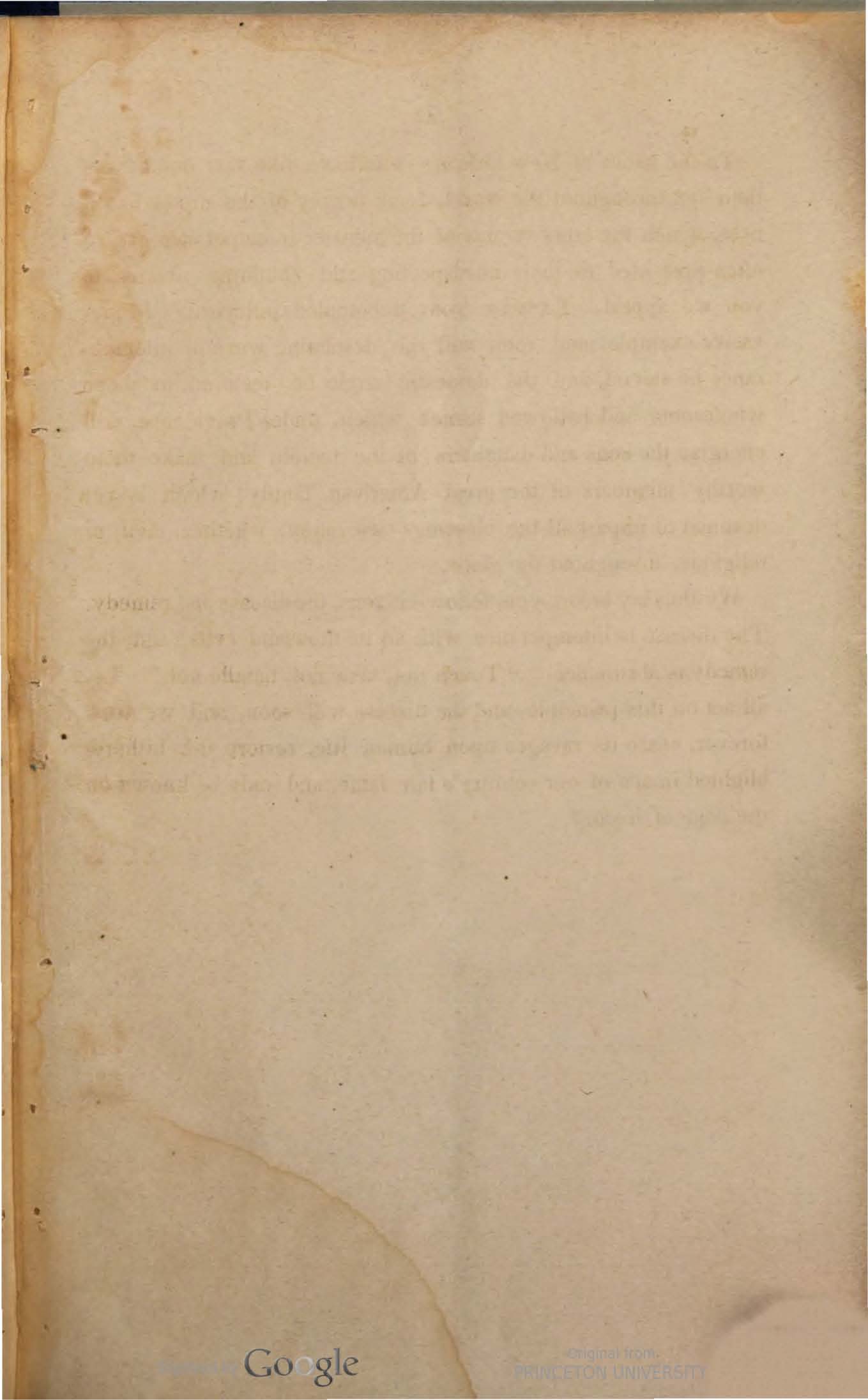
•
I'
)
I
•
,
Go gIe
Go gle
PRINCETON UNIVERSITY LIBRARY
J .
7
This book is due on the latest date stamped below. Please retw'n or renew by this date.
Go sIe
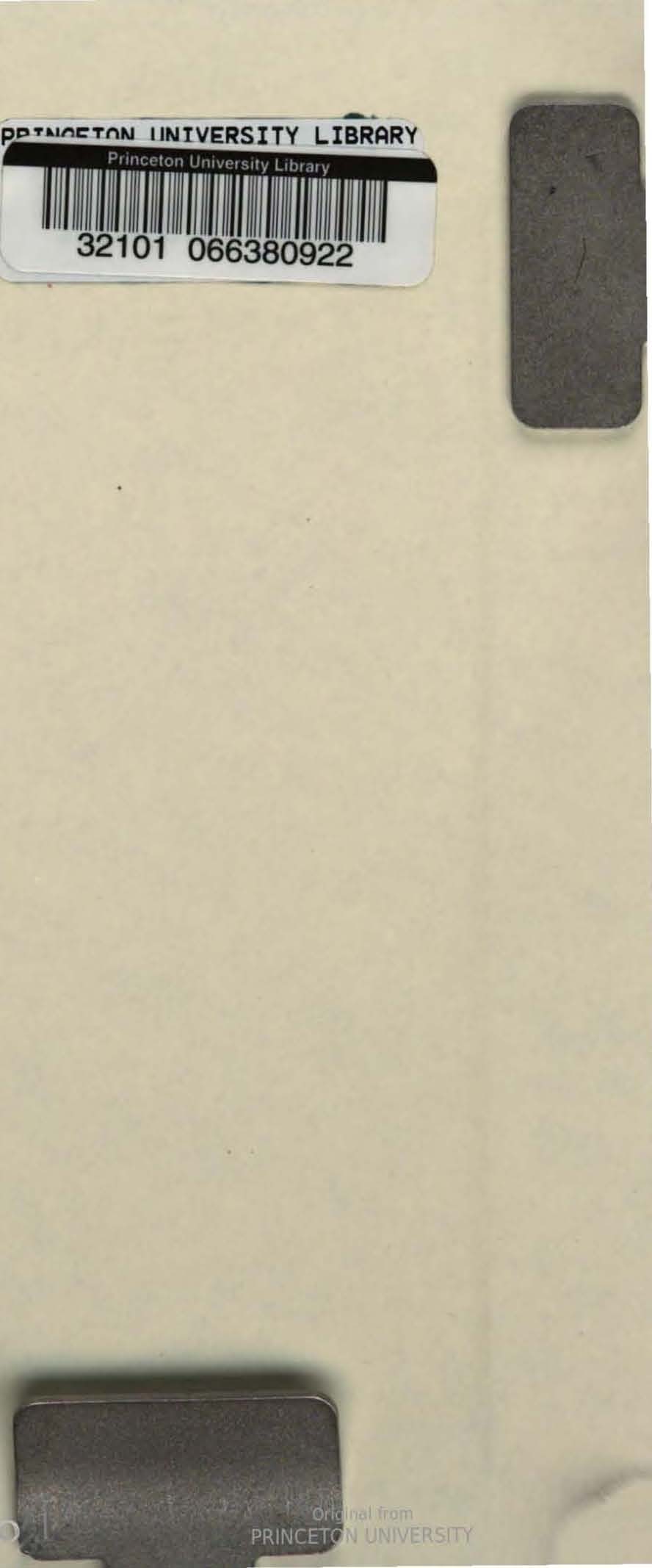
Go
